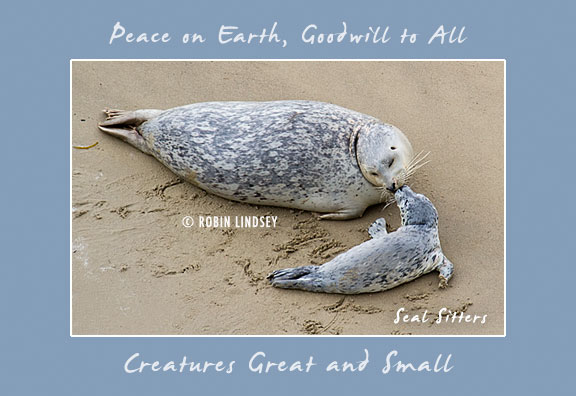Dec 2013
Seal Sitters reflects on another record-breaking year
Dec/31/13 05:09 AM
2013 was a roller coaster year for Seal Sitters’ volunteers. Early in the year, we received a grant for an educational outreach project, Year of the Seal, which culminated with the installation of a bronze sculpture at Alki Beach in September. Additionally, it proved to be another record-breaking season for responses to marine mammals on the beaches of West Seattle. Volunteers donated thousands of hours to the very time-intensive endeavor of protecting seal pups on urban beaches while also navigating the sometimes murky waters of a public art project.
THE STATS
2013 was a record breaking season for seal pups on shore in West Seattle. Seal Sitters’ hotline operators fielded many hundreds of calls from all over the Puget Sound region (check back for updated stats on hotline calls). Harbor seal pupping season in South Puget Sound is late June - September, but our busiest months are September and October as pups leave the relative safety of rookeries and strike out on their own.
On July 19th we responded to a report of our first newborn pup of the season, a stillbirth on Harbor Island. Since late July to date in West Seattle, volunteers have logged over 163 responses to marine mammals on the beach, the large majority of which were seal pups, but a few also to harbor porpoise and sea lions. In the past 6 months, we have protected 66 positively identified pups ranging in age from a few days to a few months old (an increase from 51 ID’d pups in 2011’s record year) - a number of these pups hauled out repeatedly for days in a row. With a higher number of seal pups, we also responded to more dead pups, 24 (10 of whom were pups we had protected). Most disturbing was the disproportionate number of emaciated pups for the second year in a row.
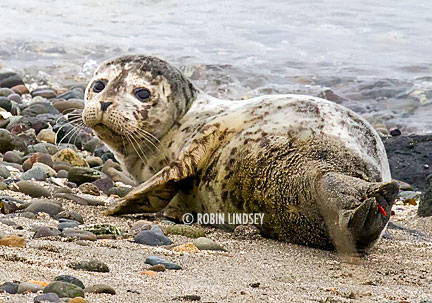 A highlight of pupping season was the story of Ruby, a newborn seal pup who had been harassed by people and dogs on a Steilacoom beach and subsequently abandoned by her mom. Only a week or so old, the pup was transported to PAWS in Lynnwood for rehabilitation. Following a successful and lengthy rehab, she was released back to the wild at a harbor seal haul-out near Everett. Ruby appeared one day on shore in West Seattle with her distinctive red rehab tag attached to her flipper (photo right). Over the course of several months, volunteers monitored Ruby’s health as she foraged and rested at Jack Block Park, where she found a true friend in seal pup Buddy. Their friendship was heartwarming and thrilling for both volunteers and the public who observed them daily. Read about Ruby and Buddy here.
A highlight of pupping season was the story of Ruby, a newborn seal pup who had been harassed by people and dogs on a Steilacoom beach and subsequently abandoned by her mom. Only a week or so old, the pup was transported to PAWS in Lynnwood for rehabilitation. Following a successful and lengthy rehab, she was released back to the wild at a harbor seal haul-out near Everett. Ruby appeared one day on shore in West Seattle with her distinctive red rehab tag attached to her flipper (photo right). Over the course of several months, volunteers monitored Ruby’s health as she foraged and rested at Jack Block Park, where she found a true friend in seal pup Buddy. Their friendship was heartwarming and thrilling for both volunteers and the public who observed them daily. Read about Ruby and Buddy here.
Why are there so many seal pups in West Seattle? That is, of course, difficult to answer. Perhaps our proximity to both Puget Sound and Elliott Bay waters with a varied food source. Certainly, it could it be, too, that we have made a refuge on shore for struggling pups so that they can get the rest they need. Our community has rallied around the protection of these small and vulnerable marine mammals. If a seal pup can feel safe on the beach and there is a food source nearby, that pup will continue to forage and return to the beach, gaining the strength necessary to survive that critical first year.
PROJECTS
Seal Sitters received a third City of Seattle Department of Neighborhoods in-kind grant award this year. As a result, a high-visibility educational project was completed:
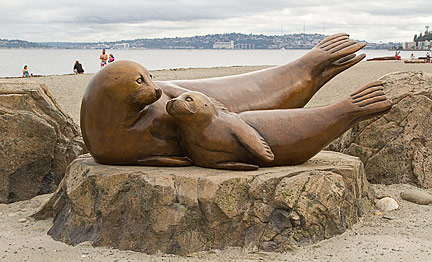 • Year of the Seal. This educational outreach project’s goal was to educate the public about the dangers of marine pollution and its devastating impact on marine life.
• Year of the Seal. This educational outreach project’s goal was to educate the public about the dangers of marine pollution and its devastating impact on marine life.
• Sentinels of the Sound. A bronze sculpture by acclaimed Northwest artist Georgia Gerber was installed at Alki Beach, along with an informational plaque. View videos here.
• Harbor Seal Day. Over 300 people attended a sculpture dedication ceremony and educational outreach event held at the Alki Bathhouse on September 8th. Proclaimed Harbor Seal Day by Seattle Mayor Mike McGinn and Washington Governor Jay Inslee, nine environmental groups had booths and educated the public about marine mammals, marine debris and pollution.
COMMUNITY OUTREACH
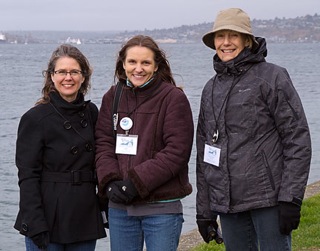 Passionate volunteers like Christine, Nina and Connie donated thousands of hours of educational outreach on the beaches and at events, working the hotline and scheduling volunteers. Thousands of Share the Shore pocket brochures were distributed.
Passionate volunteers like Christine, Nina and Connie donated thousands of hours of educational outreach on the beaches and at events, working the hotline and scheduling volunteers. Thousands of Share the Shore pocket brochures were distributed.
• We participated in a number of street fairs and events, educating many hundreds of people about marine mammals, marine pollution and NOAA’s NW stranding network.
• Seal Sitters co-sponsored a beach cleanup with the Alki Community Council and Seattle Parks and Recreation, receiving media coverage and raising awareness about marine debris.
• Volunteers made presentations at schools; area children took the pledge to protect the marine environment and received Seal Ambassador certificates. If you know a child who would like to become an ambassador, contact us.
• 129 new volunteers were trained in 2013.
MEDIA
• KCTS-9 documentary filmmaker Katie Campbell did a feature segment on Seal Sitters which continues to air regularly on the PBS station. The segment centered on last year’s survival struggles of seal pups on our West Seattle shores, the impact of toxins on marine mammals and funding cuts for research.
• Print, tv and internet media kept Seal Sitters’ work in the news.
• Seal Sitters young volunteers were featured in a Scholastic Magazine cover story. Our kids rock!
YOU CAN HELP
Thanks to all our amazing volunteers and to the community for making this such a successful year. If you’d like to help support Seal Sitters’ work with a donation, please click here. We receive no funding for our on-going expenses and even the smallest amount helps defray the cost of our dedicated hotline, websites, gas and stranding and educational supplies. We wish everyone a peaceful and happy new year!
THE STATS
2013 was a record breaking season for seal pups on shore in West Seattle. Seal Sitters’ hotline operators fielded many hundreds of calls from all over the Puget Sound region (check back for updated stats on hotline calls). Harbor seal pupping season in South Puget Sound is late June - September, but our busiest months are September and October as pups leave the relative safety of rookeries and strike out on their own.
On July 19th we responded to a report of our first newborn pup of the season, a stillbirth on Harbor Island. Since late July to date in West Seattle, volunteers have logged over 163 responses to marine mammals on the beach, the large majority of which were seal pups, but a few also to harbor porpoise and sea lions. In the past 6 months, we have protected 66 positively identified pups ranging in age from a few days to a few months old (an increase from 51 ID’d pups in 2011’s record year) - a number of these pups hauled out repeatedly for days in a row. With a higher number of seal pups, we also responded to more dead pups, 24 (10 of whom were pups we had protected). Most disturbing was the disproportionate number of emaciated pups for the second year in a row.

Why are there so many seal pups in West Seattle? That is, of course, difficult to answer. Perhaps our proximity to both Puget Sound and Elliott Bay waters with a varied food source. Certainly, it could it be, too, that we have made a refuge on shore for struggling pups so that they can get the rest they need. Our community has rallied around the protection of these small and vulnerable marine mammals. If a seal pup can feel safe on the beach and there is a food source nearby, that pup will continue to forage and return to the beach, gaining the strength necessary to survive that critical first year.
PROJECTS
Seal Sitters received a third City of Seattle Department of Neighborhoods in-kind grant award this year. As a result, a high-visibility educational project was completed:

• Sentinels of the Sound. A bronze sculpture by acclaimed Northwest artist Georgia Gerber was installed at Alki Beach, along with an informational plaque. View videos here.
• Harbor Seal Day. Over 300 people attended a sculpture dedication ceremony and educational outreach event held at the Alki Bathhouse on September 8th. Proclaimed Harbor Seal Day by Seattle Mayor Mike McGinn and Washington Governor Jay Inslee, nine environmental groups had booths and educated the public about marine mammals, marine debris and pollution.
COMMUNITY OUTREACH

• We participated in a number of street fairs and events, educating many hundreds of people about marine mammals, marine pollution and NOAA’s NW stranding network.
• Seal Sitters co-sponsored a beach cleanup with the Alki Community Council and Seattle Parks and Recreation, receiving media coverage and raising awareness about marine debris.
• Volunteers made presentations at schools; area children took the pledge to protect the marine environment and received Seal Ambassador certificates. If you know a child who would like to become an ambassador, contact us.
• 129 new volunteers were trained in 2013.
MEDIA
• KCTS-9 documentary filmmaker Katie Campbell did a feature segment on Seal Sitters which continues to air regularly on the PBS station. The segment centered on last year’s survival struggles of seal pups on our West Seattle shores, the impact of toxins on marine mammals and funding cuts for research.
• Print, tv and internet media kept Seal Sitters’ work in the news.
• Seal Sitters young volunteers were featured in a Scholastic Magazine cover story. Our kids rock!
YOU CAN HELP
Thanks to all our amazing volunteers and to the community for making this such a successful year. If you’d like to help support Seal Sitters’ work with a donation, please click here. We receive no funding for our on-going expenses and even the smallest amount helps defray the cost of our dedicated hotline, websites, gas and stranding and educational supplies. We wish everyone a peaceful and happy new year!
Active pup keeps Seal Sitters on alert
Dec/28/13 05:32 AM
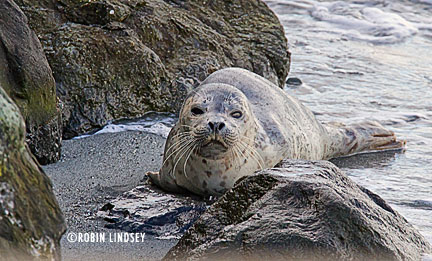
Seal Sitters’ hotline operator fielded a call yesterday morning of a seal pup resting on a tiny sliver of beach at Duwamish Head. Two first responders were on the scene within minutes, restricting access to the steps that led to down the sleeping pup. Shortly after getting a buffer zone established on the sea wall above, the incoming tide swept over the weaner and we thought he might return to the Sound. Instead, the pup flop-hopped across the sand to the base of the stairs.
Under the watchful eye of volunteers, the pup dubbed Lulu rested until noon, leaving the beach briefly and wriggling back ashore about 30 minutes later. The active pup did two more return trips to the water, but finally settled back in for a sleep from 3:30 until 5pm. Lulu swam off in search of dinner. Since there was no sign of the pup after dark, volunteers cold from the brisk winds went home to warm up after long hours on duty. The perimeter was left intact in anticipation that she might return during the night or early morning. Since this small beach is frequented by people who let their dogs illegally on the beach, it was imperative that the perimeter stay up overnight to protect the pup in the absence of volunteers.
Lulu was reasonably plump and had no obvious health issues during our observation yesterday.
Very early this morning, Lulu was found snoozing once again on the beach. Based on her tracks in the sand, it appears as if she hauled out around 2 am’s high tide. Volunteers looked after sweet Lulu throughout the day and the pup finally returned to the Sound about 3:30 pm. The pup was exhibiting some signs of potential lung and congestive issues as she moved slowly down to the tideline.
PUPDATE 12/29/13
Lulu was found having seizures at the north end of Alki Beach last evening. Despite the fact that there was no rehab facility open until early morning, the pup had to be taken from this section of beach, notorious for illegally off leash dogs. It was too unsafe for the helpless pup to remain on the beach until morning. Sadly, Lulu died overnight, but the body was taken to PAWS this morning for necropsy. We will update with details of cause of death when we receive the information.
Surprise gift for the holidays
Dec/23/13 04:48 AM
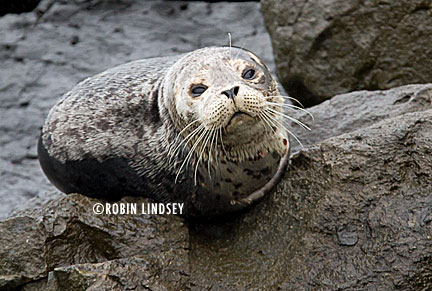
However, we did want to confirm identity since another pup was seen hanging around the cove the day before. Identification and health assessment photos showed that the pup was indeed a new one in our database. It can be very difficult to compare markings, especially if one coat is wet and another dry. A wet coat shows the unique spot patterns much more clearly than dry or semi-dry fur (such as Shorty’s on Saturday). While many of the facial markings were similar, we could see that we had another pup on our hands.
This new pup, dubbed Tootsie, rested high above the tide line as the water receded. The pup had reasonably good body weight for a 4-6 month old weaner this time of year. About 2:30, she decided it was time to forage for a late lunch. Tootsie rolled and tumbled about 3 feet trying to maneuver her way down to the Bay. She rested for a few minutes after falling, apparently uninjured, and then traversed the remaining rocks and slid off into the gray water. She was seen foraging offshore for some time along with various shorebirds who feasted on small fish. Thanks to our dedicated volunteers who stood in the rain, watching over Tootsie.
The perimeter was left in place for the evening, but as of 8:30 pm no pups had returned. Volunteers will be monitoring the site early this morning. We expect Tootsie, Shorty or another little blubberball to show up again today. If a pup comes up with this morning’s 12-foot tide, he or she will be resting very high up on the rocks and terribly vulnerable to disturbance and potential fall-related injury. As usual, Seal Sitters’ volunteers will be on duty talking to the public and ensuring the pup’s protection. Maybe we’ll have two pups resting on the rocks today!
PUPDATE 12/23 6:28 am
No pups on the rocks yet this morning.
12/24 4:37 am
No sign of Tootsie or Shorty yesterday. Volunteers will be on the lookout for the duo and any of their pals today.
Winter solstice brings seal pup Shorty to shore
Dec/22/13 04:08 AM
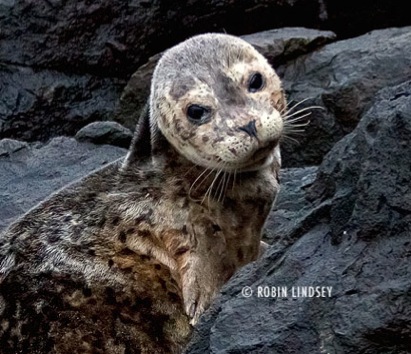
Lars quickly called the hotline and first responders established a tape perimeter and “do not enter - resting seal pup” signs to create a buffer zone on the grass and sidewalk above. With little foot traffic as darkness approached and the rain increased in intensity, the pup settled in for the night. He was still sleeping soundly as of 9pm.
Volunteers will be checking this morning to see if Shorty (nicknamed for Winter Solstice, the shortest day of the year) returned to Elliott Bay overnight or is still on shore.
We have had a lull in activity of pups on the beach needing protection. A number of pups have been seen resting on offshore platforms off Lowman Beach, Lincoln Park, Beach Drive and Alki or swimming along the shoreline. We never know when a pup will pick a public spot to rest and warm up. Seal Sitters volunteers are always on call and ready to give them sanctuary on shore when they do!
PUDATE 8:20am
Shorty was not on shore at 6:30am. We have left up the tape perimeter in anticipation that he might return soon after this morning’s high tide.
Pup braves bitter cold to take a snooze
Dec/10/13 09:44 PM
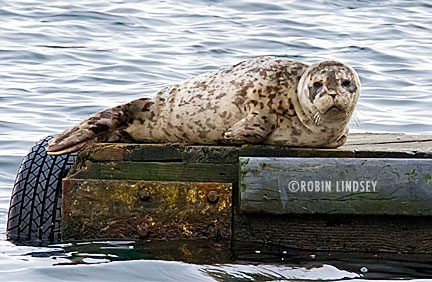
Volunteers kept watch over the pup, nicknamed Frio (cold in Spanish), for the next couple of hours. Around noon, a boat motored in from Elliott Bay to tie up at the public launch’s second dock opposite the pup (closed to onlookers, but open to boaters for launch and retrieval). The activity spooked Frio who slid off this perch and vanished into the gray water.
There hasn’t been much seal activity on shore since Thanksgiving Day when we captured and transported Moonshadow to PAWS. Temperatures have plummeted into the 20’s to low 30’s. There have been many days, such as yesterday, when the air temperature has been almost 20 degrees colder than the waters of Puget Sound/Elliott Bay (click here to see real-time daily air and water temperatures in Northwest Washington).
During these cold snaps, seals often opt to rest in the Sound rather than brave the frigid air and wind. Since harbor seals’ nostrils are naturally closed (they must force them open to take a breath), they can deep dive and sleep in the water. During storms and freezing weather, they often “bottom rest”, coming up for air every 20-30 minutes. Healthy seals are insulated with a thick layer of blubber which keeps their body core temperature a toasty 100 degrees F. This fat layer is also metabolized to provide energy. Thinner harbor seal pups with very little blubber to keep them warm are susceptible to hypothermia and other health issues - and these winter months can take a terrible toll. Thankfully, Frio appears to have a bit more insulation than most pups have had this season - truly a holiday gift for volunteers!
Killer Whale Tales, an educational outreach group that is a tremendous resource for kids about orcas, has created a fun activity that shows how blubber is used for insulation. Click here to take the blubber test.
Moonshadow loses battle to survive
Dec/05/13 04:19 AM
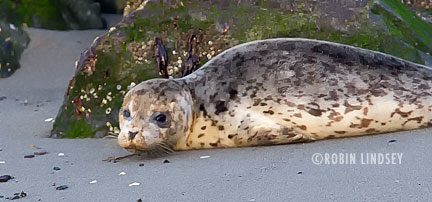
Seal Sitters’ first responders and volunteers had observed Moonshadow over the course of a week as he came ashore almost every evening at dark and returned to the Sound near sunrise. On Sunday, he spent an uncharacteristic 22 hours on the beach which raised concern. The next day, however, Moonshadow returned to his behavior of 12-14 or so hours on shore. Still, it was evident that the pup was having some health issues, though he was not exhibiting severe symptoms such as prolonged coughing. On Wednesday morning the pup remained on the beach at daylight, but was at the tide line and capture was too risky. Responders had to be assured that we could successfully capture Moonshadow - if we were not successful, the frightened pup would most likely abandon this relatively safe haul-out site (a small beach with only one public entrance, blocked off with Protected Marine Mammal tape to deter access). Because of PAWS shortened winter hours, a capture could not be performed after dark. Early Thanksgiving morning, the sleeping pup had blood from the nose and the conditions were ripe for capture. First responders swiftly swept up the pup and transported him to PAWS.
Moonshadow weighed 11.7 kg on intake Thanksgiving morning - certainly thin, but not as thin as most of the pups we have protected this year. He did exhibit discharge from the nose and mouth. The pup died overnight.
NECROPSY FINDINGS
Heartfelt thanks to PAWS’ staff and Dr. Bethany Groves for performing the necropsy in hopes to determine cause of death. The necropsy revealed that his airways were “jam-packed” with adult lungworms and the pup had parasite-related nodules throughout his lungs. Additionally, Moonshadow had pneumonia, likely due to the parasitic infestation. This infection is likely the cause of death. The pup also had a large number of roundworms in his stomach, but no food. Medical treatment to kill off such a high worm load can be extremely dangerous in itself to a weak pup. All weaned pups have some level of parasite load this time of year, but those with weakened immune systems are often not strong enough to keep opportunistic parasites and related viruses at bay - a very sad and hard fact.
Thanks to Seal Sitters’ many dedicated volunteers and a concerned public who allowed Moonshadow to rest undisturbed on this urban beach. Moonshadow’s death reinforces just how vulnerable these seal pups are and how quickly their health can tailspin. Sharing the shore gives them a much better chance to survive.
